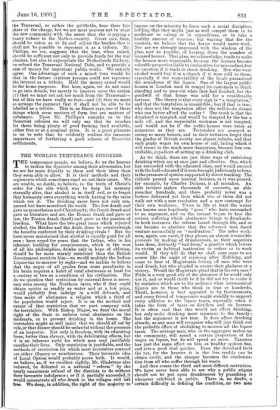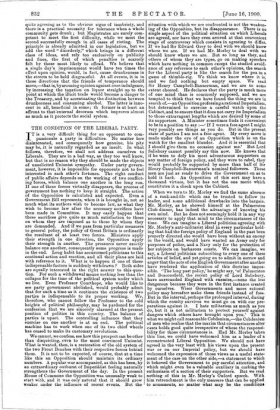THE WORLD'S TEMPERANCE CONGRESS. T HE temperance people, we believe, do
us the honour to reckon the Spectator among their adversaries, but we are far more friendly to them and their ideas than they seem able to allow. It is their methods and their arguments which sometimes repel us, not their cause. We are unable, no doubt, to believe, in the teeth of Christ's order for the rite which was to keep his memory eternally alive, that alcohol is in itself evil, or to forget that humanity owes everything worth having to the races which use it. The drinking races have not only con- quered but have moralised the world. The Jew drank and gave us monotheism and Christianity, the Greek drank and gave us literature and art, the Roman drank and gave us law, the Teuton drank (hard) and gave us the passion of freedom. What have the two great races which rejected alcohol, the Hindoo and. the Arab, done to counterweigh the benefits conferred by their drinking rivals ? But we have never maintained that alcohol is equally good for all men ; have urged for years that the Indian, who in his inherent loathing for consciousness, which is the root of all his philosophies, drinks only in hope of oblivion, should be far more sternly restricted than the British Government restricts him—we would multiply the Indian Liquor-tax to-morrow by eight—and we incline to believe that the negro of all grades from some peculiarity in his brain requires a habit of total abstinence at least for a century or two as a condition of his civilisation. Nor do we question that restriction by external force is neces- sary even among the Northern races, who if they could obtain spirits as readily as water and at a low price, would probably first indulge in a wild debauch, and then make of abstinence a religion which a third of the population would reject. It is on the method and extent of that restriction that we part company with the teetotalers. With Bishop Magee, we deny the moral right of the State to enforce total abstinence on the moderate, or to prevent drinking in the home. The teetotalers might as well insist that we should all eat by rule,or that dinner should be unlawful without the presence of an inspector. Not only is freedom, with its educating force, better than slavery, with its debilitating effects, but it is an inherent right for which men may justifiably sacrifice their lives. Only restriction is justifiable, and the methods of restriction for which most teetotalers contend are either illusory or mischievous. Their favourite idea of Local Option would probably prove both. It would, we believe, as, if we recollect rightly, Mr. Gladstone also believed, be defeated as a national " reform " by the nearly unanimous refusal of the districts to do without their favourite indulgence ; or if it partially succeeded, it would concentrate all who drank in the villages still left free. We deny, in addition, the right of the majority to impose on the minority by force such a social discipline, holding that they might just as well compel them to be moderate in eating or in expenditure, or to take a healthy amount of exercise ; but waiving that for the moment, we believe that the device would never work. Nor are we strongly impressed with the wisdom of the plan, now so popular, of keeping down the number of licensed houses. That plan, we acknowledge, tends to make the houses more respectable, because the licenses become valuable properties liable to confiscation for misconduct, but we question if it tends to check drinking. Men who want alcohol would buy it in a church if it were sold to them, especially if the respectability of the locale guaranteed the soundness of the liquor. One of the largest public houses in London used to compel its customers to drink standing and to pass out when they had finished, but the goodwill of that house was sold for a considerable fortune. The theory is that every sign is "a temptation," and that the temptation is irresistible; but if that is true, why does not the temptation affect the well-to-do classes who can better afford the outlay ? The truth is that the drunkard is tempted, and would be tempted by the bar a mile off, and the respectable workman is not tempted, and would not be if the public-houses were twice as numerous as they are. Teetotalers are annoyed at seeing so many houses, and in their irritation forget that the grades of British society are almost infinite, and that each grade wants its own house of call, failing which it will resort to the much more dangerous, because less con- trollable, expedient of setting up a drinking club.
As we think, there are just three ways of restricting drinking which are at once just and effective. One, which has succeeded with the educated class and would succeed with the half-educated if it were brought judiciously to bear, is the pressure of opinion supported by direct teaching. The ridicule poured upon teetotal lectures, as it was poured, for example, by Charles Dickens, is all mistaken. An able lecturer makes thousands of converts, an able preacher hundreds, and there probably never was a lecture delivered yet from which two or three did not walk out with a new resolution and a new contempt for their own weakness. Twice in life at least the writer has known men hopelessly " gone " who have succumbed to an argument, and on the instant begun to face the serious suffering which abstinence brings to drunkards. In both instances the reform lasted through life, and in one became so absolute that the reformed man dared venture successfully on "moderation." The sober work- men, again, can exert, if they please, an almost irresistible pressure by making of drunkenness, as their superiors have done, distinctly "bad form," a practice which lowers its victim as habitual inattention to orders or to work would. If they will do that we shall soon cease to see scenes like the night of rejoicing after Mafeking, and cease to hear of Magistrates letting off men who were mad drunk, but who pleaded in excuse their gladness at a victory. Would the Magistrate plead that in his own case ? Pride is a very good ally of the abstainer if he would only use it, and so would thrift be if he did not try to excite it by statistics which are to his audience what astronomical figures are to those who think in tens or hundreds. Thrift, however, is best appealed to by Governments, and every friend of temperance ought steadily to support every addition to the liquor taxes, especially when it takes the form of taxes on distillers and on licenses. It is often said that this would not affect drinking, but only make drinking more injurious to the family ; but the argument is not true. It does affect drinking already, as any man will recognise who will just think out the probable effect of abolishing to-morrow all the liquor taxes. The average man, who in the aggregate makes up the community, will spend a certain proportion of his wages on liquor, but he will spend no more. Taxation has just the same effect on him as healthy opinion has, and acts a good deal quicker. Even the drunkard feels the tax, for the heavier it is the less readily can be obtain credit, and the sharper becomes the condemna- tion from all who suffer through his waste.
And then comes the third and most difficult restriction. We have never been able to see why a public stigma should not be put upon drunkenness by punishing it whenever exhibited in public. There is, no doubt, a certain difficulty in defining the condition, no two men quite agreeing as to the obvious signs of ineobriety, and there is a practical necessity for tolerance when a whole community gets drunk ; but Magistrates are surely com- petent to meet the first difficulty, while we meet the second successfully enough in all cases of rioting. The principle is already admitted, in our legislation, but we add the word 'disorderly," which brings in a different class of ideas, and rely too exclusively on publicity and fines, the first of which penalties is scarcely felt by those most likely to offend. We believe that a single day's imprisonment would have ten times the effect upon opinion, would, in fact, cause drunkenness in the streets to be held disgraceful. At all events, it is in these directions that the friends of temperance should move,—that is, by arousing opinion against over-indulgence, by increasing the taxation on liquor straight up to the point at which the illicit trade would become a danger to the Treasury, and by accentuating the distinction between drunkenness and consuming alcohol. The latter is inno- cent in all, beneficial in some ; th former is at least an affront to that'external decorum which improves almost as much as it protects the social system.







































 Previous page
Previous page